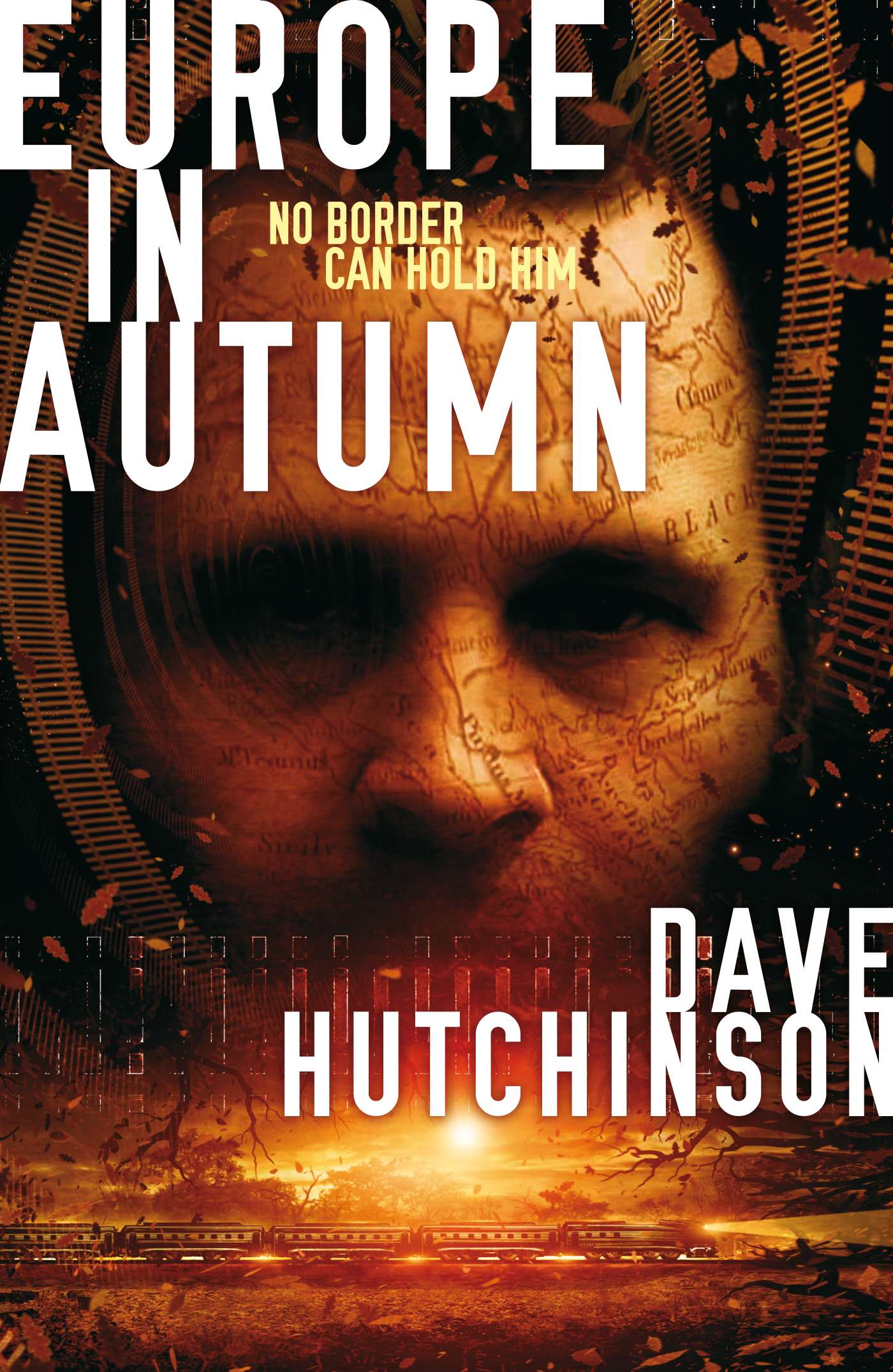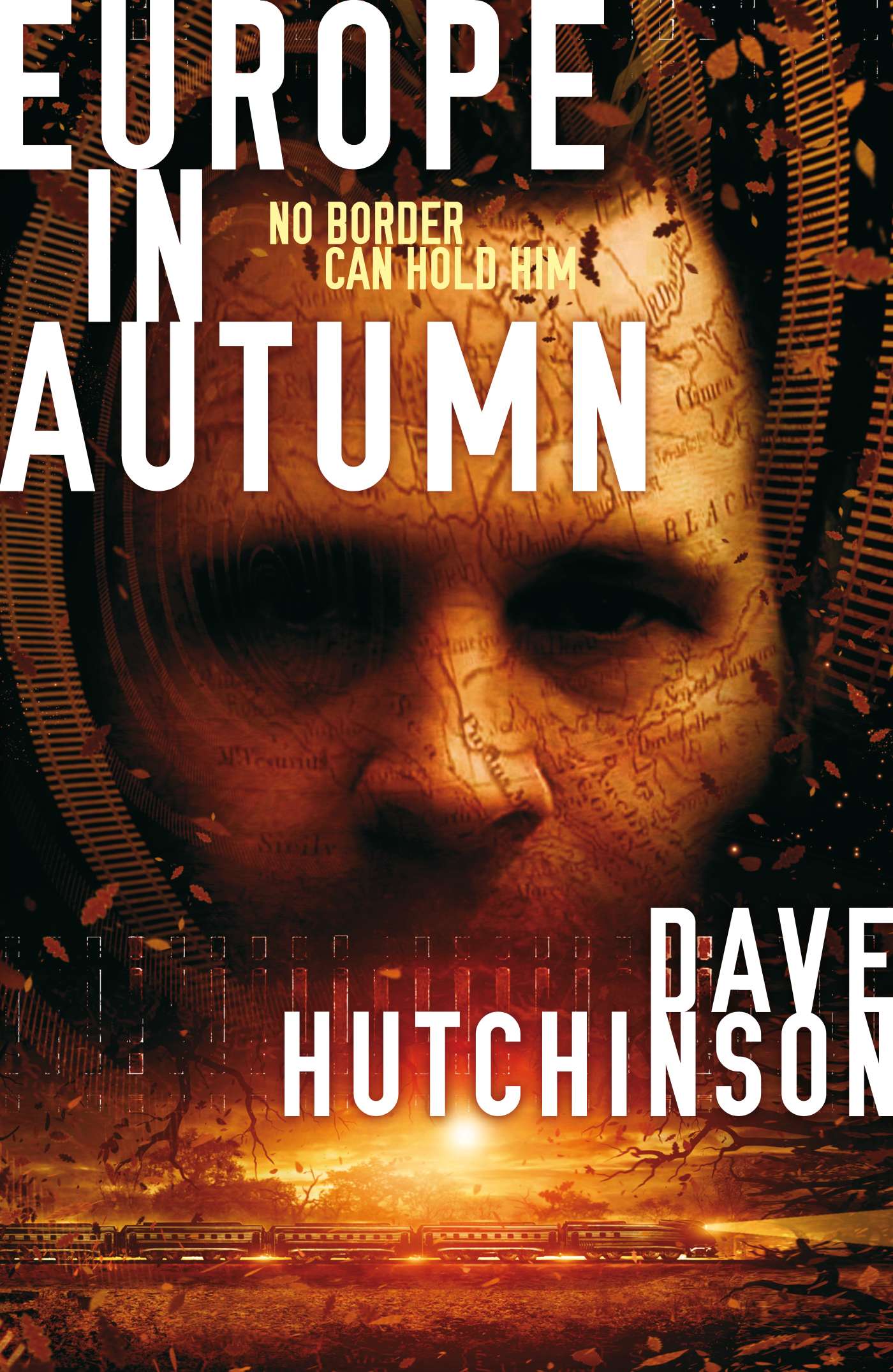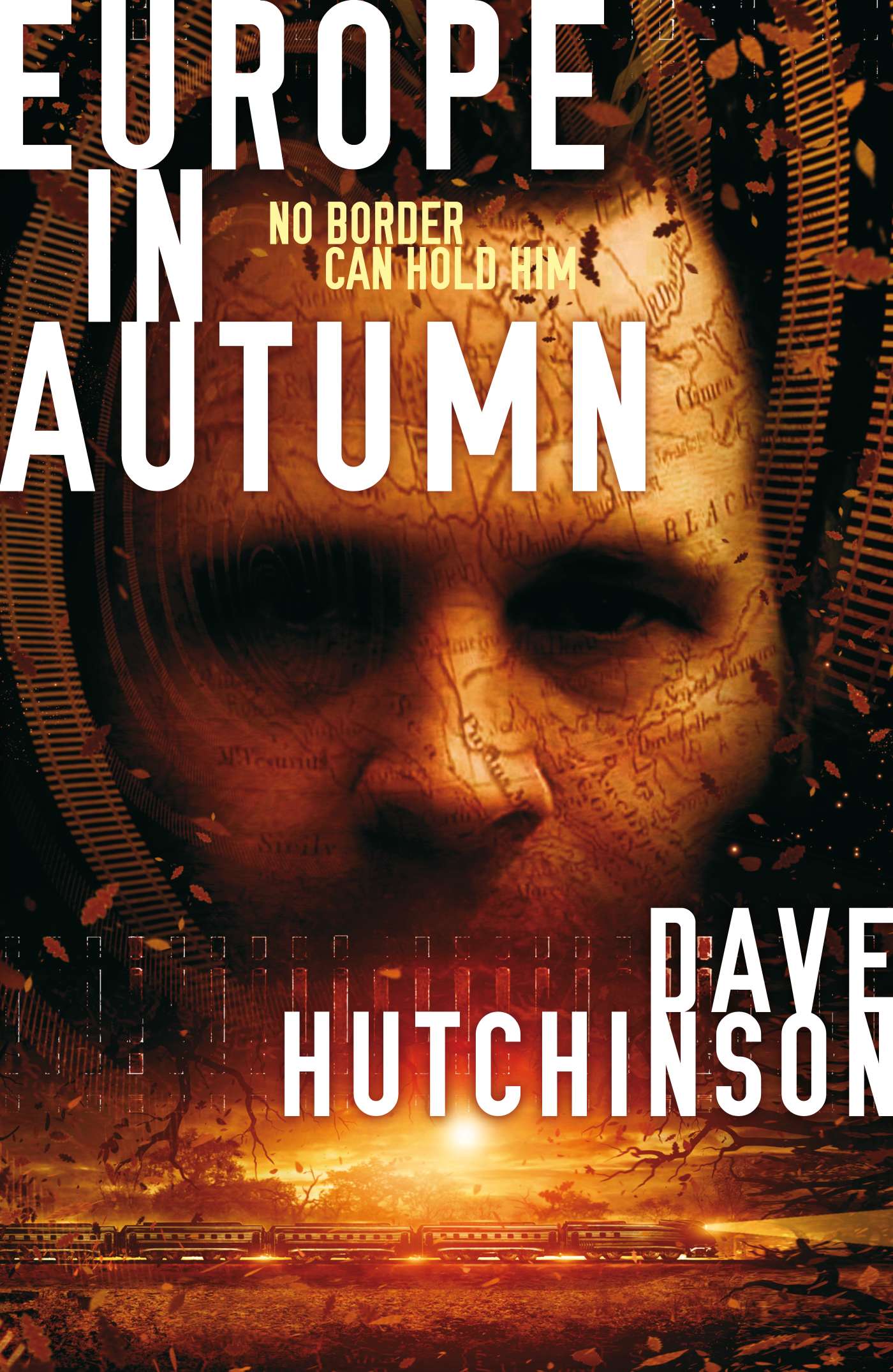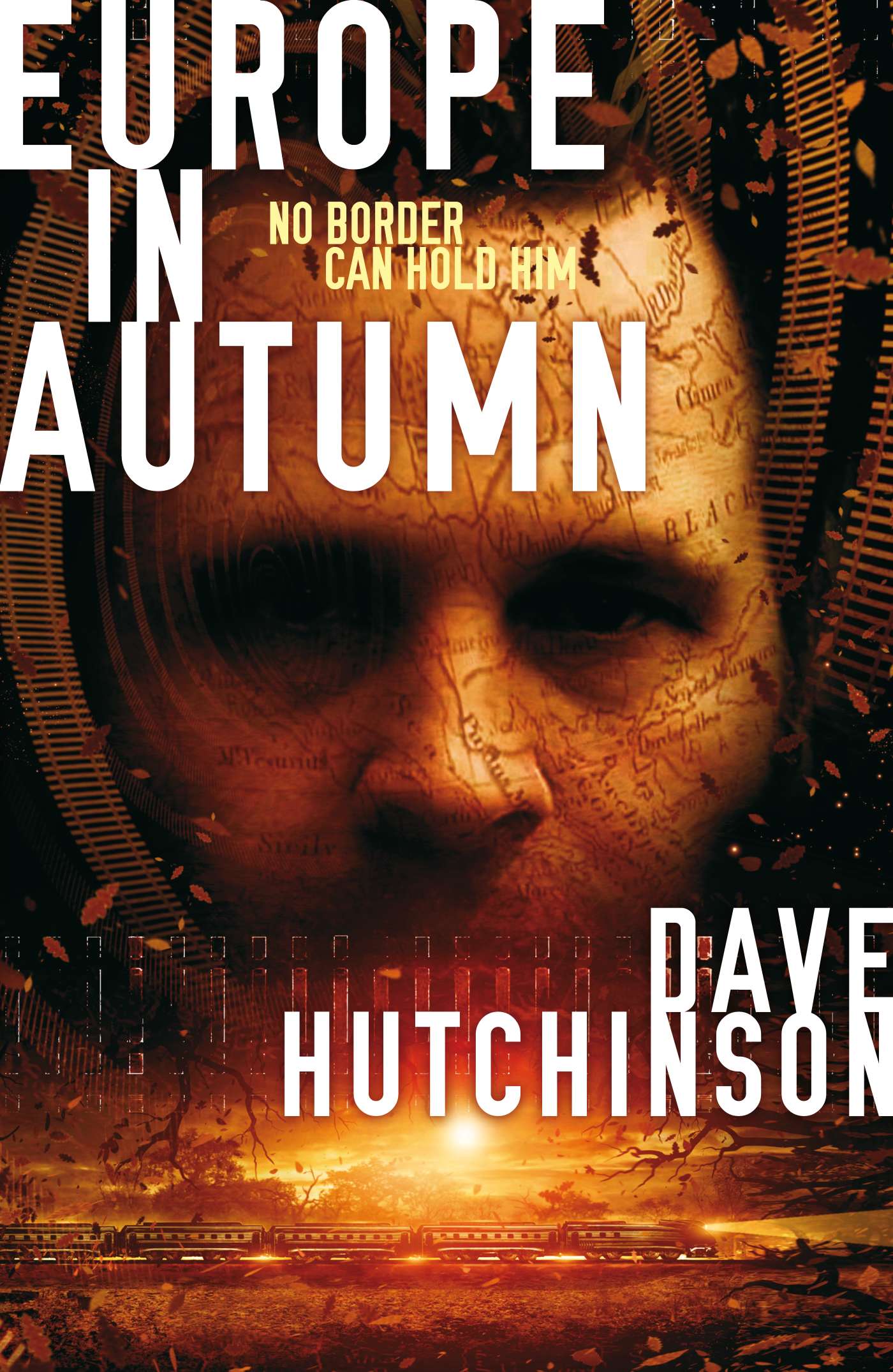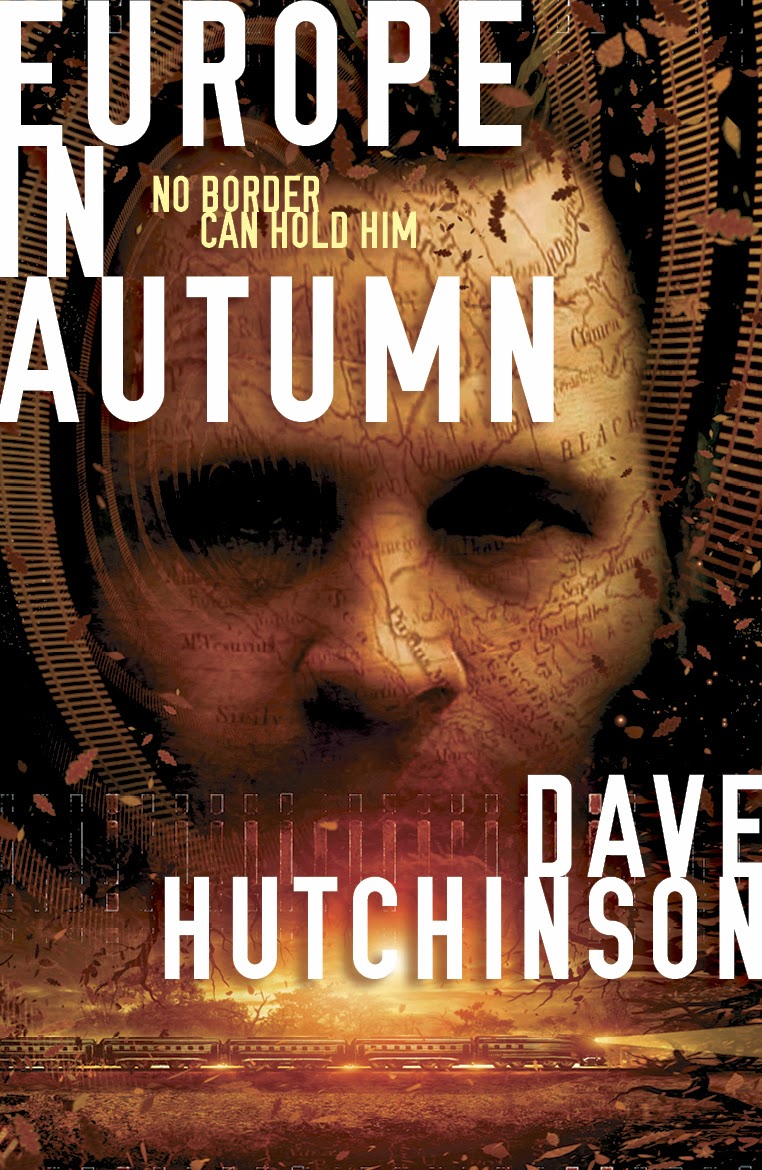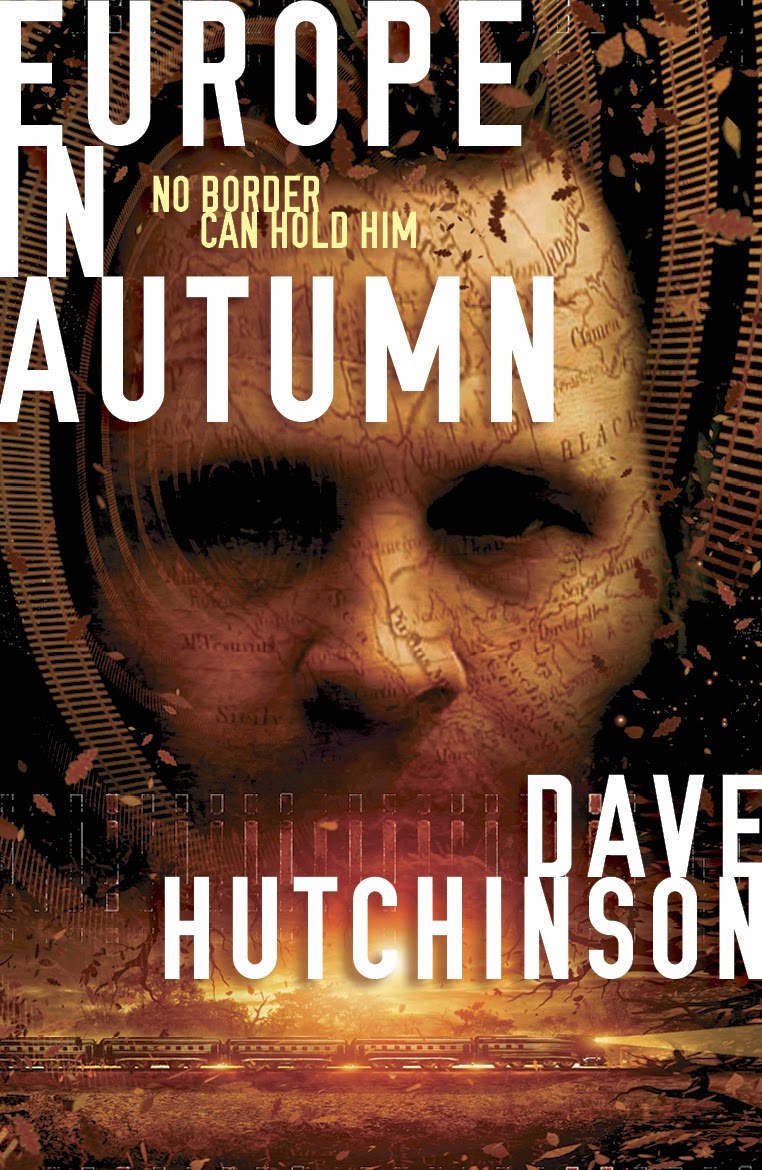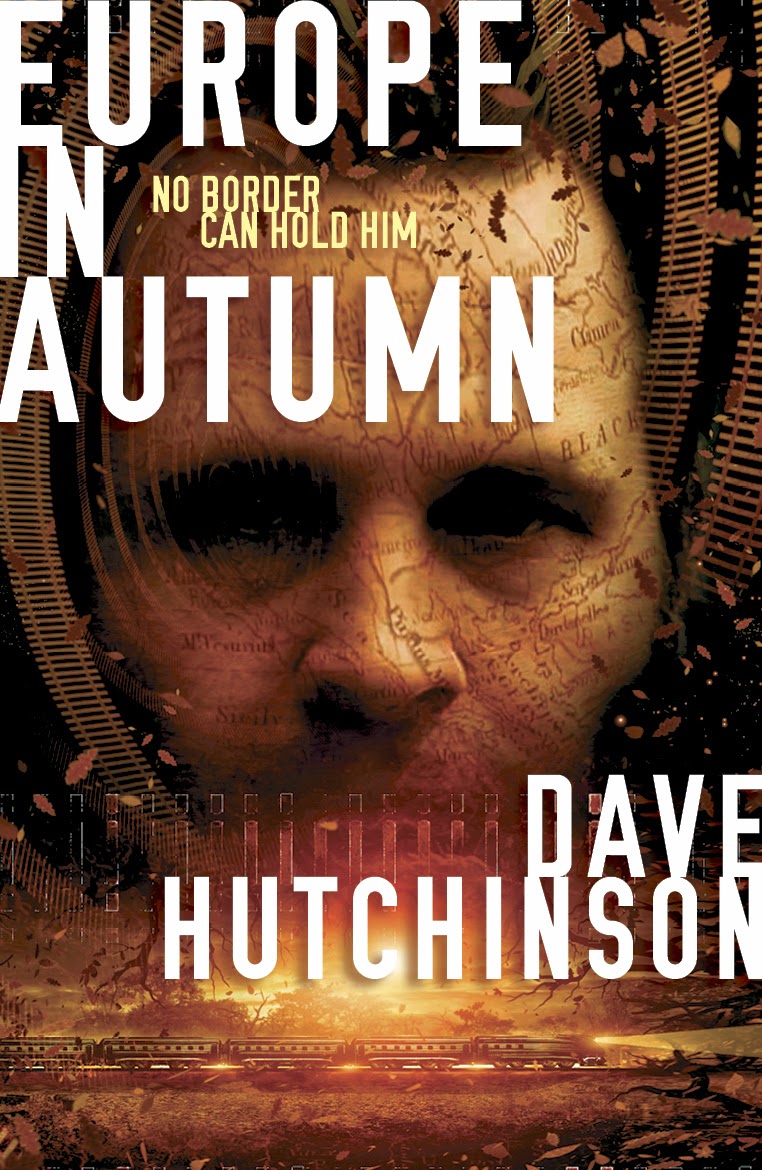
Europe in Autumn
By Dave Hutchinson
£7.99 (UK) ISBN 9781781081952
$7.99/$9.99 (US & CAN) ISBN 9781781081945
Available in paperback and ebook from Amazon.co.uk
Available in paperback and ebook from Amazon.co.uk
http://www.rebellionstore.com/products/europe_in_autumn
“Europe in Autumn is the work of a consummate storyteller and combines great characters, a cracking central idea, and a plot that will keep you on the edge of your seat. Excellent.” – Eric Brown
A fractured Europe, a cook-turned-spy, a mighty web of espionage – but what happens when conspiracy threatens to overwhelm even reality itself?
Europe in Autumn is a dystopian SF espionage thriller that evokes the Cold War novels of John Le Carré and the nightmarish world of Franz Kafka, taking place in a war and disease-torn Europe of hundreds of tiny nations.
Rudi is a cook in a Kraków restaurant, but when boss asks him to help a cousin escape from the country he’s trapped in, a new career – part spy, part people-smuggler – begins.
Recruited by the shadowy organisation Les Coureurs des Bois, Rudi is schooled in espionage. When he is sent to smuggle someone out of Berlin and finds a severed head inside a locker instead, a conspiracy begins to wind itself around him.
With kidnapping, double-crosses and a map that constantly re-draws itself, Europe in Autumn is a modern science fiction thriller like no other.
Europe in Autumn hits book stores tomorrow and to tease your literary taste buds, we are very pleased to present – for free and your reading pleasure – the first chapter…
Max’s Cousin
1.
The Hungarians came into the restaurant around nine in the evening, eight large men with gorgeously-tailored suits and hand-stitched Italian shoes and hundred-złoty haircuts. Michał, the maitre d’, tried to tell them that there were no tables free unless they had a reservation, but they walked over to one of the large tables and sat down. One of them plucked the Reserved card from the middle of the tablecloth and sailed it out across the restaurant with a snap of the wrist and a bearish grin, causing other diners to duck.
Max, the owner, had a protection deal with Wesoły Ptak, but instead of calling them or the police – either of which would have probably resulted in a bloodbath – he seized a notepad and set off across the restaurant to take the Hungarians’ orders. This show of confidence did not prevent a number of diners signalling frantically for their bills.
The Hungarians were already boisterous, and shouted and laughed at Max while he tried to take their orders, changing their minds frequently and causing Max to start all over again. Finally, he walked back from the table to the bar, where Gosia was standing frozen with fear.
“Six bottles of Żubrówka, on the house,” he murmured calmly to the girl as he went by towards the kitchen. “And try to be nimble on your feet.”
Rudi, who had been standing in the kitchen doorway watching events with interest, said, “Something awful is going to happen, Max.”
“Cook,” Max replied, handing him the order. “Cook quickly.”
By ten o’clock the Hungarians had loosened their ties and taken off their jackets and were singing and yelling at each other and laughing at impenetrable jokes. They had completed three courses of their five-course order. They were alone in the restaurant. With most of the meal completed, Rudi told the kitchen crew they could go home.
At one point, one of the Hungarians, an immense man with a face the colour of barszcz, began shouting at the others. He stood up, swaying gently, and yelled at his compatriots, who goodnaturedly yelled at him to sit down again. Sweat pouring down his face, he turned, grasped the back of a chair from the next table, and in one easy movement pivoted and flung it across the room. It crashed into the wall and smashed a sconce and brought down a mirror.
There was a moment’s silence. The Hungarian stood looking at the dent in the wallpaper, frowning. Then he sat down and one of his friends poured him a drink and slapped him on the back and Max served the next course.
As the hour grew late the Hungarians became maudlin. They put their arms around each others’ shoulders and began to sing songs that waxed increasingly sad as midnight approached.
Rudi, his cooking finished for the night and the kitchen tidied up and cleaned, stood in the doorway listening to their songs. The Hungarians had beautiful voices. He didn’t understand the words, but the melodies were heart-achingly lonely.
One of them saw him standing there and started to beckon urgently. The others turned to see what was going on, and they too started to beckon.
“Go on,” Max said from his post by the bar.
“You’re joking,” said Rudi.
“I am not. Go and see what they want.”
“And if they want to beat me up?”
“They’ll soon get bored.”
“Thank you, Max,” Rudi said, setting off across the restaurant.
The Hungarians’ table looked as if someone had dropped a five-course meal onto it from ceiling height. The floor around it was crunchy with broken glass and smashed crockery, the carpet sticky with sauces and bits of trodden-in food.
“You cook?” said one in appalling Polish as Rudi approached.
“Yes,” said Rudi, balancing his weight on the balls of his feet just in case he had to move in a hurry.
The Polish-speaker looked like a side of beef sewn into an Armani Revival suit. His face was pale and sweaty and he was wearing a shoulder-holster from which protruded the handgrip of a colossal pistol. He crooked a forefinger the size of a sausage. Rudi bent down until their faces were only a couple of centimetres apart.
“Respect!” the Hungarian bellowed. Rudi flinched at the meaty spicy alcohol-and-tobacco gale of his breath. “Everywhere we go, this fuck city, not respect!”
This statement seemed to require a reply, so Rudi said, “Oh?”
“Not respect,” the Hungarian said, shaking his head sadly. His expression suddenly brightened. “Here, Restaurant Max, we got respect!”
“We always respect our customers,” Max murmured, moving soundlessly up beside Rudi.
“Fuck right!” the Hungarian said loudly. “Fuck right. Restaurant Max more respect.”
“And your meal?” Max inquired, smiling.
“Good fuck meal,” the Hungarian said. There was a general nodding of heads around the table. He looked at Rudi and belched. “Good fuck cook. Polish food for fuck pigs, but good fuck cook.”
Rudi smiled. “Thank you,” he said.
The Hungarian’s eyes suddenly came into focus. “Good,” he said. “We gone.” He snapped a few words and the others around the table stood up, all save the one who had thrown the chair, who was slumped over with his cheek pressed to the tablecloth, snoring gently. Two of his friends grasped him by the shoulders and elbows and lifted him up. Bits of food adhered to the side of his face.
“Food good,” the Polish-speaker told Rudi. He took his jacket from the back of his chair and shrugged into it. He dipped a hand into his breast pocket and came up with a business card held between his first two fingers. “You need working, you call.”
Rudi took the card. “Thank you,” he said again.
“Okay.” He put both hands to his face and swept them up and back in a movement that magically rearranged his hair and seemed to sober him up at the same time. “We gone.” He looked at Max. “Clever fuck Pole.” He reached into an inside jacket pocket and brought out a wallet the size and shape of a housebrick. “What is?”
“On the house,” Max said. “A gift.”
Rudi looked at his boss and wondered what went on underneath that shaved scalp.
The Hungarian regarded the restaurant. “We break much.”
Max shrugged carelessly.
“Okay.” The Hungarian removed a centimetre-thick wad of złotys from the wallet and held it out. “You take,” he said. Max smiled and bowed slightly and took the money, then the Hungarians were moving towards the exit. A last burst of raucous singing, one last bar stool hurled across the restaurant, a puff of cold air through the open door, and they were gone. Rudi heard Max locking the doors behind them.
“Well,” Max said, coming back down the stairs. “That was an interesting evening.”
Rudi picked up an overturned stool, righted it, and sat at the bar. He had, he discovered, sweated entirely through his chef’s whites. “I think,” he said, “you should renegotiate your subscription to Wesoły Ptak.”
Max went behind the bar. He bent down and started to search the shelves. “If Wesoły Ptak had turned up tonight, half of us would have wound up in the mortuary.” He straightened up holding half a bottle of Starka and two glasses.
Rudi took his lighter and a tin of small cigars from his pocket. He lit one and looked at the restaurant. If he was objective about it, there was actually very little damage. Just a lot of mess for the cleaners to tackle, and they’d had wedding receptions that had been messier.
Max filled the two glasses with vodka and held one up in a toast. “Good fuck meal,” he said.
Rudi looked at him for a moment. Then he picked up the other glass, returned the toast, and drained it in one go. Then they both started to laugh.
“What if they come back?” Rudi asked.
But Max was still laughing. “Good fuck meal,” he repeated, shaking his head and refilling the glasses.
The Hungarians did not come back, which seemed to bear out Max’s view that they had just been out for a good time rather than intent on muscling in on Wesoły Ptak’s territory.
Wesoły Ptak – the name meant Happy Bird – was a deeply diversified organisation. Its many divisions included prostitution, drugs, armed robbery, a soft-drink bottling factory on the outskirts of Kraków, a bus company, any number of unlicenced gambling dens, and a protection racket centred around Floriańska Street, just off the Market Square of Poland’s old capital.
They were not, on the whole, known for their violent nature, preferring to apply force with surgical precision rather than in broad strokes. For instance, a restaurateur or shopkeeper who tried to organise his neighbours against the gang might find himself in hospital with anatomically-novel joints imposed on his legs. The other rebels would get the point, and the uprising would end. Another gang might be more likely to launch a massive firebombing campaign, or a wave of spectacularly bloody killings, but Happy Bird were content with a less-is-more approach.
In the wake of the Hungarians’ visit to Restauracja Max, some of the other businesses began to wonder out loud just what they were paying Wesoły Ptak for. This went on for a day or so, and then the son of one of the owners suffered a minor accident at school. Nothing life-threatening, just a few bumps and scrapes, and after that the grumbling along Floriańska subsided.
A week or so later, Dariusz, Wesoły Ptak’s representative, visited Restauracja Max one evening just before closing. All the staff but Rudi and Michał had gone home. Max asked Rudi to prepare two steak tartares, and he and Dariusz took a bottle of Wyborowa and a couple of glasses over to a table in the darkest corner of the deserted restaurant.
When Rudi emerged from the kitchen with the components of the steak tartares on a tray, Max and Dariusz were deep in conversation inside a cloud of cigarette smoke dimly-illuminated by the little sconce on the wall above their table.
As Rudi approached with the food, Dariusz looked up and smiled. “Supper,” he said.
Rudi set out on the table the trays of anchovies and chopped onions, the little bowls of pickled cucumbers, the condiments, plates of rye bread, saucers of unsalted butter, the two plates of minced beef, each with an egg yolk nestling in a hollow on top.
“We were discussing your visitors of last month,” Dariusz said.
“It was an eventful evening,” Rudi agreed, swapping the table’s ashtray for a clean one. “Have a good meal.”
“Why don’t you sit and have a drink with us?” Dariusz asked.
Rudi looked at Max, sitting at the other side of the table like a smoothly prosperous Silesian Buddha, hands clasped comfortably against the broad expanse of his stomach. Max was smiling gently and looking off into some faraway vista. He nodded fractionally.
Rudi shrugged. “All right.” He put the tray and the dirty ashtray on the next table, pulled up a chair, and sat.
“A busy night,” Max rumbled, picking up a fork.
Rudi nodded. Takings had gone down for a couple of days after the Hungarians visited, but they were back up now. Earlier in the week, Max had murmured something about a raise, but Rudi had known him long enough not to take it seriously.
“I was wondering about Władek,” Max said.
Władek was the latest of a long line of alleged cooks to arrive at Restauracja Max and then discover that they were not being paid enough for the long hours and hard work.
“He seems keen,” Rudi said, watching Max use the edge of his fork to mash up the egg and beef on his plate.
“They all do, at first,” Max agreed. “Then they get greedy.”
“It’s not greed, Max,” Rudi told him.
Max shook his head. “They think they can come here and be ready to open their own restaurant after a month. They don’t understand the business.”
Max’s philosophy of the restaurant business shared certain features with Zen Buddhism. Rudi, who was more interested in cooking than philosophy, said, “It’s a common enough misconception.”
“It’s the same in my business,” Dariusz said. Rudi had almost forgotten the little man was at the table, but there he was, mixing anchovies and chopped onion into his beef with a singleminded determination. “You should see some of our recruits, particularly these days. They think they’ll be running the city in a year.” He smiled sadly. “Imagine their disappointment.”
“Yes,” Rudi said. “The only difference is that it’s easier for a sous-chef to leave a restaurant than it is for someone to leave Wesoły Ptak.” Max glanced up from his plate, sighed, shook his head, and went back to mashing his meal together with his fork.
If Dariusz was offended, he gave no sign. “We’re a business, like any other,” he said.
“Not quite like any other,” said Rudi. Max looked at him again. This time he frowned before returning his attention to his steak.
Dariusz also frowned, but the frown was barely discernible, and it was gone after a moment. “Well, we do less cooking, it’s true,” he said, and he laughed. Max smiled and shook his head.
Rudi sat back and crossed his arms. Wesoły Ptak was nothing out of the ordinary; he had encountered organisations like it in Tallinn and Riga and Vilnius, and they were all alike, and Dariusz didn’t fit the demographic. He looked ordinary, a slim little middle-aged man with a cheap haircut and laugh-lines around his eyes. If he was armed, his unprepossessing off-the-peg business suit hid it wonderfully well.
“Should we worry about the Hungarians?” Rudi asked.
Dariusz looked up from his meal, his eyebrows raised in surprise. “Worry?” he asked. “Why should you worry?”
Rudi shrugged and watched Max working on his steak. Rudi hated steak tartare. The customer did all the preparation themselves, and they took up table space while they did it. Poles in particular seemed to regard it as a social occasion. They took forever about it, tasting over and over again and minutely adjusting the seasoning. When he had his own restaurant, steak tartare would not be on the menu.
Dariusz reached out and touched Rudi’s forearm. Rudi noticed his fingernails were chewed. “You mustn’t worry,” Dariusz said.
“All right,” said Rudi.
“This kind of thing happens all the time.”
“Not to me it doesn’t.”
Dariusz smiled. “You have to think of us like nations. Poles and Hungarians are the criminal princes of Europe.”
“And the Bulgarians,” Max put in goodnaturedly.
Dariusz shrugged. “Yes, one must include the Bulgarians as well. We must constantly visit, check each other out, put our toes in the water,” he told Rudi. “It’s a matter of diplomacy.”
“Do you mean what happened here the other night was a diplomatic incident?” said Rudi.
“It might well have been, if wiser heads had not prevailed.” Dariusz nodded at Max.
“You haven’t got a drink,” Max observed. He looked across the restaurant and Michał, responding with a maitre d’s telepathy, brought a clean glass over to the table for Rudi and then retreated behind the bar. Max filled the glass with vodka and said, “They were just looking for a good time, but nobody would give them one because everyone was afraid of them.”
“I can’t blame them,” Dariusz said. He tasted his steak, winced, reached for the tabasco bottle and shook a few drops onto the meat. “A bunch of drunken Hungarians, armed to the teeth, wandering into restaurants and bars. What’s one to think?”
“Indeed,” Max agreed.
“It would be their own fault if someone was to over-react,” Dariusz went on. He tasted his steak again, and this time it was more to his liking. This time he actually lifted a forkful into his mouth and chewed happily.
“And nobody would want that,” Max said. Apparently, his steak was also prepared to his satisfaction. He started to eat.
“Well, precisely,” said Dariusz. “Something like that could start a war.” He looked at Rudi and cocked his head to one side. “You’re from Tallinn, yes?”
“I was born in Taevaskoja,” Rudi said. “But I’ve lived in Tallinn.”
“I’ve never been there.” Dariusz looked at his glass, but it was empty. “What’s it like?”
Rudi watched Max filling Dariusz’s glass. “It’s all right.”
“You speak very good Polish, for an Estonian.”
Rudi picked up his own glass and drained it in one swallow. “Thank you.”
Dariusz put down his fork and burst out laughing. He reached over and tapped Max on the shoulder. “I told you!” he said. “Didn’t I tell you?”
Max smiled and nodded and went on eating. Rudi uncapped the Wyborowa and poured himself another drink. Michał had told him that Wesoły Ptak took their name from a song by Eugeniusz, one of a long line of Polish sociopolitical balladeers to rise briefly to fame before drinking themselves to death or being shot by jealous husbands or jilted lovers. The bird sings in its cage and its owners think it’s happy, Michał had told him, but the bird is still in a cage. The reference had completely baffled Rudi.
“We were discussing geopolitics,” Dariusz told him. “Do you think much about geopolitics?”
“I’m a cook,” Rudi said. “Not a politician.”
“But you must have an opinion. Everyone has an opinion.”
Rudi shook his head.
Dariusz looked disbelievingly at him. He picked up his glass and took a sip of vodka. “I saw on the news last week that so far this year twelve new nations and sovereign states have come into being in Europe alone.”
“And most of them won’t be here this time next year,” said Rudi.
“You see?” Dariusz pointed triumphantly at him. “You do have an opinion! I knew you would!”
Rudi sighed. “I only know what I see on the news.”
“I see Europe as a glacier,” Max murmured, “calving icebergs.” He took a mouthful of his steak tartare and chewed happily.
Rudi and Dariusz looked at him for a long time. Then Dariusz looked at Rudi again. “Not a bad analogy,” he said. “Europe is calving itself into progressively smaller and smaller nations.”
“Quasi-national entities,” Rudi corrected. “Polities.”
Dariusz snorted. “Sanjaks. Margravates. Principalities. Länder. Europe sinks back into the Eighteenth Century.”
“More territory for you,” Rudi observed.
“The same territory,” Dariusz said. “More frontiers. More red tape. More borders. More border police.”
Rudi shrugged.
“Consider Hindenberg, for example,” said Dariusz. “What must that have been like? You go to bed in Wrocław, and you wake up in Breslau. What must that have been like?”
Except that it hadn’t happened overnight. What had happened to Wrocław and Opole and the little towns and villages inbetween had taken a long, bitter time, and if you followed the news it was obvious that for the Poles the matter wasn’t settled yet.
“Consider the days after World War Two,” Rudi said. “Churchill, Roosevelt and Stalin meet at Yalta. You go to bed in Breslau and wake up the next morning in Wrocław.”
Dariusz smiled and pointed his fork at him, conceding the point.
There was a brief lull in the conversation.
“I have a cousin in Hindenberg,” Max mused.
Dariusz looked at him. “For that matter,” he said, “why don’t you live there yourself? You’re Silesian.”
Max grunted.
“Do you see much of your cousin?” Dariusz asked.
Max shrugged. “Travel is difficult. Visas and so forth. I have a Polish passport, he is a citizen of Hindenberg.”
“But he telephones you, yes? Emails you?”
Max shook his head. “Polish Government policy,” he rumbled.
Dariusz pointed at Rudi. “You see? You see the heartache such things can cause?”
Rudi poured himself another drink, thinking that this discussion had become awfully specific all of a sudden.
“So,” Dariusz said to Max. “How long is it since you were in contact with your cousin?”
“Some time,” Max agreed thoughtfully, as if the subject had not occurred to him for a while. “Even the post is uncertain, these days.”
“A scandal,” Dariusz muttered. “A scandal.”
Rudi drank his drink and stood up to go, just to see what would happen.
What happened was that Dariusz and Max continued to stare off into their respective distances, considering the unfairness of Hindenberg and Poland’s attitude towards it. Rudi sat down again and looked at them.
“So here we are,” he said finally. “Two men with Polish passports who would find it difficult to get a visa to enter Hindenberg. And one Estonian who can practically walk across the border unmolested.”
Dariusz seemed to regain consciousness. His expression brightened. “Of course,” he said. “You’re Estonian, aren’t you.”
Rudi sucked his teeth and poured another drink.
“Rudi’s an Estonian, Max,” Dariusz said.
Rudi rubbed his eyes. “Is it,” he asked, “drugs?”
Dariusz looked at him, and for a moment Rudi thought that, under the correct circumstances, the little mafioso might be quite a scary person. “No,” said Dariusz.
“Fissile material?”
Dariusz shook his head.
“Espionage?”
“Best you don’t know,” said Max.
“A favour,” Dariusz told him earnestly. “You do us a favour, we owe you a favour.” He smiled. “That can’t be entirely bad, can it?”
It could be bad in any number of unforeseen ways. Rudi silently cursed himself. He should have just served the food and gone home.
“How do I make the delivery?”
“Well,” Dariusz said, scratching his head, “that’s more or less up to you. And it’s not a delivery.”
Later that night, stepping out of the shower, Rudi caught sight of himself in the mirror over the sink. He took a towel off the rail and stood looking at his reflection.
Well, there he was. A little shorter than average. Slim. Short mousy brown hair. Bland, inoffensive face; not Slavic, not Aryan, not anything, really. No sign of the Lapp heritage his father had always claimed for the family. Hazel eyes. The odd nick here and there, medals of his life as a chef. That scar on his forearm from an overturned wok in Vilnius, the one just above it from the time he slipped in The Turk’s kitchen in Riga and the paring knife he was carrying got turned around somehow and went straight through his uniform sleeve and the skin and muscle beneath.
“Don’t run in my kitchen!” The Turk had shouted at him. Then he had bandaged Rudi’s arm and called for an ambulance.
Rudi lifted his right hand above his head and turned so he could see the long curving scar that started just above his hipbone and ended beside his right nipple. Not a kitchen accident, this one. Skinheads, the day he tried to find work in Warnemünde. He still didn’t know whether they had meant to kill him or just scare him, and he thought that even they had not been sure. He had taken it as an omen that his wanderings along the Baltic coast were over, and he headed inland, first to Warsaw, then Kraków.
The first thing Max did after concluding his job interview was hold out a mop.
“I’ve done all that,” Rudi protested, pointing to the envelope containing his references which Max was holding in his other hand. “Riga, Tallinn…”
“You want to work in my kitchen, first you clean it,” Max told him. “Then we’ll see.”
Rudi really considered walking out of Restauracja Max right there and then, considered going out onto Floriańska and walking back down to the station and catching a train away from this polluted little city, but he was low on cash and the job came with a cramped little room up ten flights of stairs above the restaurant and he was just tired of travelling for the moment, so he took the mop, telling himself that this was only temporary, that as soon as he had adequate funds he’d be off again in search of a kitchen that appreciated him.
He pushed that mop for eight months before Pani Stasia, Max’s fearsome chef, even allowed him to approach food. By then he was locked into a battle of wills with the wizened little woman, and the only way he was going to leave Max’s kitchen was feet first.
Looking back, it seemed astounding to him that he had stood so much. He’d done this for Sergei in Tallinn, and for The Turk, and for Big Ron in that appalling kitchen in Wilno, but for Pani Stasia there was something gratingly personal about it, as if she had made it her life’s work to break him. She yelled constantly at him. “Bring this, bring that. Clean this, clean that. So you call this clean, Baltic prick? Hurry, hurry. Don’t run in my kitchen! Faster! Faster!”
He was by no means the only member of the crew to catch Pani Stasia’s wrath. She treated everyone equally. One of her hip joints was deformed, and she walked with the aid of a black lacquered carbon fibre cane as thin as a pencil and as strong as a girder. Everyone, even Max, had heard the whistle of Pani Stasia’s cane at some time or other as it described a swift arc towards the backs of their legs.
It was understood in the business that great chefs could be violently temperamental, and if one wanted to study under them one had to endure all kinds of invective and physical violence. The Turk, who was an outstanding chef, had once knocked Rudi unconscious with a single punch for overcooking a portion of asparagus. Pani Stasia was not an outstanding chef. She was a competent chef working in a little Polish restaurant. But something about her fury lit a slumbering resistance in him which told him that this nasty little old woman was not going to drive him from her kitchen, was not going to wear him down.
So he mopped and cleaned and washed up and the skin on his hands reddened and cracked and bled and his legs hurt so much that some nights he could barely climb up to his cubbyhole in the attic. He kept going, refused to give in.
Pani Stasia, sensing the one-man resistance movement which had sprung up in her kitchen, focused her attention on Rudi. This made him popular with the other staff, who no longer had to suffer quite so much.
One day, for some imagined slight, she chased him from the kitchen in an access of rage extraordinary even by her standards, limping after him surprisingly quickly and labouring him about the head and shoulders with her cane. One whistling blow split his left earlobe and left him deaf in that ear for hours. One of the cooks ran out into the restaurant and told Max that Pani Stasia was killing Rudi, and when Max did nothing the cook went to the phone in the entranceway and called the police, who decided that their assets were best deployed elsewhere that evening and didn’t bother to respond to the call.
Max found Rudi sometime later squatting down in the alley beside the restaurant, the shoulder and arm of his whites spotted with blood.
“You’d be better off leaving,” Max told him.
Rudi looked up at the owner and shook his head.
Max watched him for a few moments, then nodded and reached down a hand to help him up.
It went on and on, until one night after closing time he was mopping the floor and she came up behind him almost soundlessly and raised her cane and he turned and caught it as it whistled towards him and for almost a minute she squeaked and struggled and swore and tried to pull the cane from his grasp. Finally, she stopped struggling and swearing and looked up at him with hot, angry eyes.
He let go of the cane and she snatched it back and stood looking at him for a few moments longer. Then she turned and stomped across the kitchen towards the exit.
The next morning, Max greeted him with the news of a pay rise and a promotion.
Not that this made much material difference. He still had to mop and clean and fetch and carry, and he still had to suffer Pani Stasia’s fury. Now, however, she expected him to learn to cook as well.
She punished every mistake, no matter how small. Once, half conscious with exhaustion, he put a fresh batch of salad into a bowl with some which had been standing already prepared for some minutes, and she almost beat him black and blue.
But he did learn. The first thing he learned was that, if he wanted to remain in Pani Stasia’s kitchen, he was going to have to forget his four-year drift along the Baltic coast. The things he had learned from The Turk and the other chefs he’d worked under meant nothing to the little old woman.
Fractionally, month after month, her periods of displeasure grew further and further apart, until one day, almost eighteen months after he first set foot in Restauracja Max, she allowed him to prepare one cover.
She wouldn’t allow it to be served, however. She prepared a duplicate cover herself and sent it out into the restaurant instead, and then set about tasting Rudi’s attempt.
As Rudi watched her he became aware that the whole kitchen had fallen silent. He looked around and found himself overwhelmed by what he thought of as a movie moment. Everyone in the kitchen was watching Pani Stasia. Even Max, standing just inside the swing door that led into the restaurant. It was, Rudi, thought, that moment in a film where the callow greenhorn finally gains the grudging respect of his mentor. He also knew that life wasn’t like the movies, and that Pani Stasia would spit the food out onto the tiled floor and then beat him senseless.
In the event, life and the movies converged just enough for Pani Stasia to turn and lean on her cane and look at her audience. She would, she told them finally, perhaps consider feeding Rudi’s service to her dog.
All the crew applauded. Rudi never heard them. He thought later that he was the only one of all of them to notice just how old Pani Stasia suddenly seemed.
She died that Summer, and Rudi simply took over. There was no formal announcement from Max, no new contract, nothing at all. Not even a pay rise. He simply inherited the kitchen. He and Max were the only mourners at the funeral.
“I never found out anything about her,” he said as they watched the coffin being lowered into the ground.
“She was,” Max said, “my mother.”
